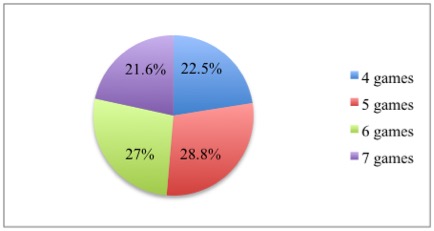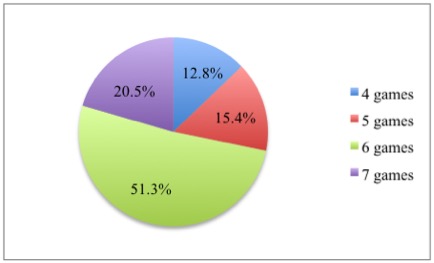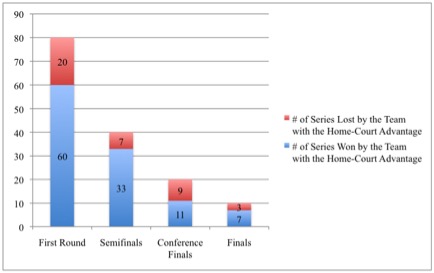In basketball, the phrase “home-court advantage” typically refers to the physical and psychological benefits that a player experiences when competing in his own arena. However, in the context of the NBA Playoffs, the team that will play at least half of the series’ games in its own arena is said to have the home-court advantage. Each NBA playoff series is composed of 4 to 7 games that are played in a 2-2-1-1-1 format. This means that the team with the home-court advantage hosts games 1, 2, 5, and 7 while its opponent hosts games 3, 4, and 6, with games 5-7 only being played if necessary. Teams prefer to host playoff games because factors like playing in a familiar environment, being surrounded by loyal fans, not having to travel, eating home-cooked meals, sleeping in your own bed, etc. have been proven to enhance player performance. Furthermore, “the psychological impact of playing at home is a self-sustaining placebo effect: Home-court advantage gives the home team an edge simply because players believe that it does” (Bleacher Report). In any given series, the home-court advantage is granted to the team with a better win-loss record, so NBA teams work to improve their regular season records in hopes that, if they make it to the playoffs, they will be ranked high enough to earn a home-court advantage. But what role does the home-court advantage actually play in a team’s success or failure in the postseason?
Each NBA Playoffs consists of 15 series, and over the last 10 years the team with the home-court advantage has won the series 111 out of a possible 150 times. That is, from the 2009 to the 2018 Playoffs, the team with the home-court advantage has won the series =0.74 or 74% of the time and lost the series =0.26 or 26% of the time. These statistics have been broken down even further in Tables A and B, which show how many series the team with the home-court advantage has won and lost, respectively, in a particular round of the playoffs and in a certain number of games.
Table A: # of Series Won by the Team with the Home-Court Advantage

Table B: # of Series Lost by the Team with the Home-Court Advantage

Home-Court Advantage and Length of Series
The contents of Table A reveal that out of the 111 teams that had the home-court advantage and won the series, 25 of them won the series in 4 games, 32 of them won the series in 5 games, 30 of them won the series in 6 games, and 24 of them won the series in 7 games. The pie chart below helps us to visualize the proportions of series won by the team with the home-court advantage in each number of games.

The pie chart shows that each of the four possible series lengths occurs roughly a quarter of the time. Thus, having the home-court advantage doesn’t help a team win the series any faster.
The contents of Table B reveal that out of the 39 teams that had the home-court advantage and lost the series, 5 of them lost the series in 4 games, 6 of them lost the series in 5 games, 20 of them lost the series in 6 games, and 8 of them lost the series in 7 games.

This second pie chart shows the proportions of series lost by the team with the home-court advantage in each number of games, and we see that the team with the home-court advantage loses the series in 4 or 5 games 28.2% of the time and in 6 or 7 games 71.8% of the time. We can conclude that it generally takes longer for the team with the home-court advantage to lose the series.
Home-Court Advantage in Specific Rounds of the Playoffs

The team with the home-court advantage is more likely than its opponent to win the series in each and every round of the playoffs. Specifically, it is about 3 times more likely to win the series in the first round, 4.7 times more likely to win the series in the semifinals, 1.2 times more likely to win the series in the conference finals, and 2.3 times more likely to win the series in the finals. However, the discrepancy between the teams’ seeds, as opposed to the games’ locations, is probably what causes the team with the home-court advantage to have greater odds of victory. The match-ups in the first two rounds of the playoffs are between teams of significantly different seeds, and this gap in skill level makes it easier for the team with the home-court advantage, which is also the higher-ranked team, to win the series. The likelihood of the team with the home-court advantage winning the series in the conference finals or finals is smaller because, in the later stages of the playoffs, teams are typically facing opponents with ranks closer to theirs. Thus, the home-court advantage appears to be beneficial only because it is granted to the higher-ranked team. In actuality, playing in its own arena does not majorly benefit a team in any round of the playoffs.
Home-Court Advantage in Game 7
In a 7-game series, the team with the home-court advantage gets to host Game 7, meaning that it gets to play in a familiar environment, be surrounded by loyal fans, and reap other such benefits that enhance its ability to win the series. Tables A and B show that 75% of the 7-game series that occurred in the last 10 years were won by the team with the home-court advantage, so we can say that the team that has the home-court advantage and plays Game 7 in its own arena has 3:1 odds of winning the entire series. Hence, Game 7 is one of the few instances where having a home-court advantage truly affects the outcome of the series.
Sources
https://www.basketball-reference.com/playoffs/
https://bleacherreport.com/articles/1520496-how-important-is-home-court-advantage-in-the-nba
About the Author
Courtney Williams graduated summa cum laude from Berry College (GA) in 2017. She earned a bachelor’s degree in mathematics, and she wants to use her knowledge of statistics, probability, and more advanced mathematics to help sports organizations make good business- and player-related decisions. Specifically, she has an interest in using data analysis to find patterns and trends present in collegiate and professional basketball.
